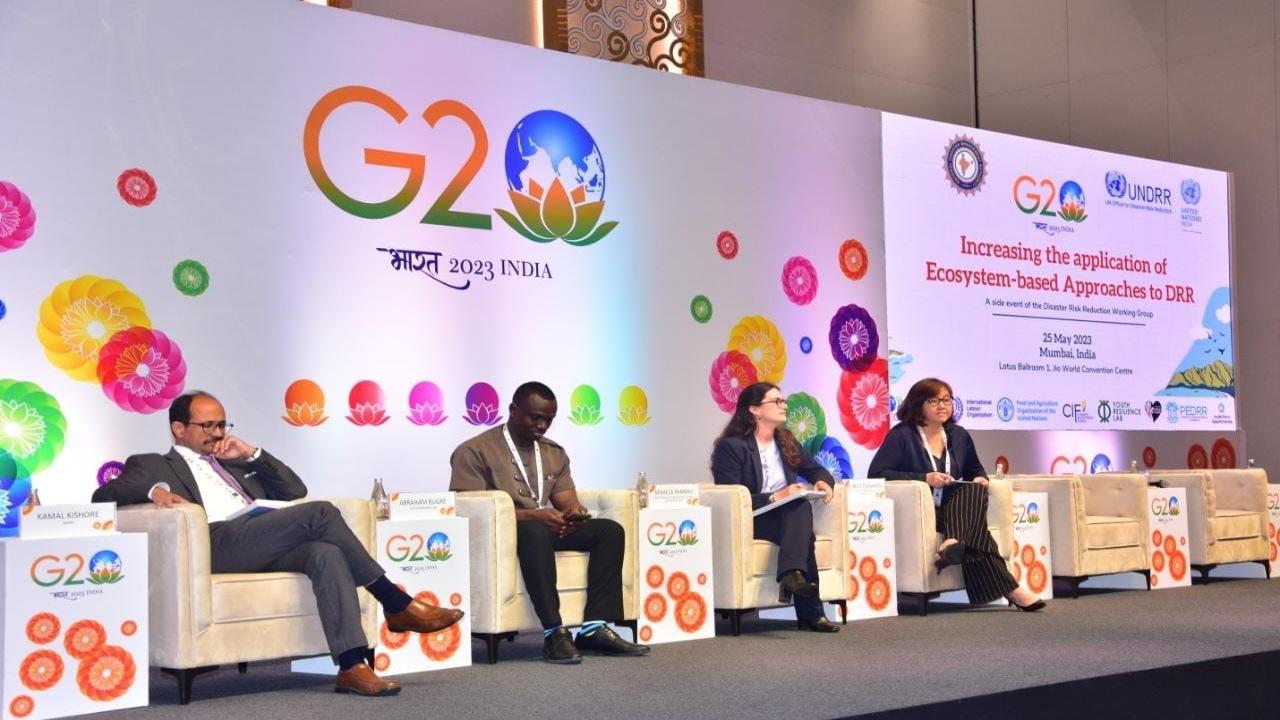G-20 Council’s Second Disaster Risk Reduction Working Group (DRRWG) meeting concluded in Mumbai on Thursday, with the technical and functional level officials coming to an understanding of the importance of Disaster Resilient Infrastructure and Financing for Disaster Risk Reduction as the central theme of any discussion on Disaster Risk Reduction

Photo: PIB Mumbai
G-20 Council’s Second Disaster Risk Reduction Working Group (DRRWG) meeting concluded in Mumbai on Thursday, with the technical and functional level officials coming to an understanding of the importance of Disaster Resilient Infrastructure and Financing for Disaster Risk Reduction as the central theme of any discussion on Disaster Risk Reduction.
ADVERTISEMENT
The delegates deliberated that an institutional framework that supports investments in infrastructure projects, avoids fragmentation, and promotes execution of such infrastructure projects is desirable and should be encouraged in the national legal framework of G-20 countries. Additionally, the role of social protection systems in mitigating the impact of disasters on the most vulnerable population groups was a key topic of discussion.
Exchange of good practices and case studies from the G-20 countries was also discussed. The DRRWG Chair (India) and Member-Secretary of National Disaster Management Authority (NDMA) Kamal Kishore offered support through collation of such data and co-development of compendium in areas of Early Warning and Early Action, Resilient Infrastructure and Financing for the Disaster Risk Reduction. Government delegates, DRR specialists, UN agency officials, representatives of community-based organizations, multilateral development banks and financial groups, and research organizations formed the participants of the 2nd DRRWG meeting. The Coalition for Disaster Resilient Infrastructure (CDRI), an important stakeholder, was also present in the deliberations.
The meeting concluded with a side event on Eco-Based Approaches for Disaster Risk Reduction by NDMA, which was organized in collaboration with knowledge partners like United Nations Office for Disaster Risk Reduction (UNDRR), UN Major Group on Children and Young People, UNEP, and others.
In course of the 2nd DRRWG meeting in Mumbai in which 122 delegates participated, a Round Table with Private Sectors focused on Financing Disaster Risk Reduction, attracting significant attendance. The discussion aimed to understand the challenges faced by the private sector in finding the DRR space lucrative.
During the technical sessions, the G20 countries discussed a roadmap for DRRWG for the next three years. The Indian Presidency believes in instilling ownership among the troika countries and South Africa to carry this initiative forward. The hope is that disaster risk reduction will be mainstreamed in the policy space, and that financing instruments and mechanisms for DRR will help shift the paradigm from disaster response to anticipatory action and risk reduction.
On Day 1 of the DRRWG meeting, discussions focused on the priority, “Financing for Disaster Risk Reduction”, through a day long side event that was further divided into sub themes under the priority. The delegates discussed various facets of making cities resilient, financing urban infrastructure, building future-ready urban infrastructure etc. The meeting also discussed other important themes, such as incentivizing private investments, sectoral interventions, insurance related mechanisms for reconstruction and social protection mechanisms. This side event witnessed the participation of experts from key International Organizations such as UNDP, OECD, IMF, ADB and EBRD.
The third and final meeting of the Disaster Risk Reduction Working Group under India’s G-20 Presidency will be held at Chennai from July 24 to 26, 2023. The DRRWG is an initiative taken by India under its G-20 Presidency. The first DRRWG meeting was held in Gandhinagar in March-April this year. This initiative of India to include Disaster Risk Reduction in the G-20 is a part of the Sendai Framework for Disaster Risk Reduction 2015 to 2030 (Sendai Framework). This was the first major agreement that provides Member-States with a concrete action plan to protect development gains from the Risk of Disaster.
 Subscribe today by clicking the link and stay updated with the latest news!" Click here!
Subscribe today by clicking the link and stay updated with the latest news!" Click here!







